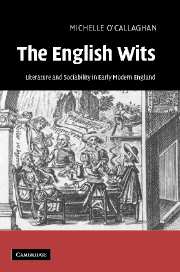Book contents
- Frontmatter
- Frontispiece
- Contents
- Acknowledgements
- Note on the text
- Introduction
- Chapter 1 Gentleman lawyers at the Inns of Court
- Chapter 2 Ben Jonson, the lawyers and the wits
- Chapter 3 Taverns and table talk
- Chapter 4 Wits in the House of Commons
- Chapter 5 Coryats Crudities (1611) and the sociability of print
- Chapter 6 Traveller for the English wits
- Chapter 7 Afterlives of the wits
- Notes
- Bibliography
- Index
Chapter 5 - Coryats Crudities (1611) and the sociability of print
Published online by Cambridge University Press: 22 September 2009
- Frontmatter
- Frontispiece
- Contents
- Acknowledgements
- Note on the text
- Introduction
- Chapter 1 Gentleman lawyers at the Inns of Court
- Chapter 2 Ben Jonson, the lawyers and the wits
- Chapter 3 Taverns and table talk
- Chapter 4 Wits in the House of Commons
- Chapter 5 Coryats Crudities (1611) and the sociability of print
- Chapter 6 Traveller for the English wits
- Chapter 7 Afterlives of the wits
- Notes
- Bibliography
- Index
Summary
The subject of this chapter is not Coryate's book of travels as such, but the body of preliminary material that makes up approximately 160 pages at the front of the Crudities: William Hole's engraved title page and the accompanying sets of distichs explicating its emblems supplied by Lawrence Whitaker and Jonson; Coryate's dedication to Prince Henry and his epistle to the reader; Jonson's ‘Character of the famous Odcombian’ together with an acrostic; and finally the extensive body of ‘Panegyricke Verses’, prefaced by Coryate's introduction. It is difficult to know just what to call this material. Preliminary material seems a misnomer since it has expanded beyond all proportion to become a book in itself, in many ways autonomous from the following travels said to provide its occasion. In fact, the ‘Panegyricke Verses’ were detached from Coryate's travel book, and republished the same year in an unauthorised edition, The Odcombian Banquet, by Thomas Thorpe. The front matter to the Crudities fashions a self-authorising company of wits, many of whom are familiar from the convivial gatherings at the Mitre and Mermaid taverns, and extends these sociable practices into the arena of print, making highly innovative use of the space at the front of the book to transform itself into a print event.
- Type
- Chapter
- Information
- The English WitsLiterature and Sociability in Early Modern England, pp. 102 - 127Publisher: Cambridge University PressPrint publication year: 2007



